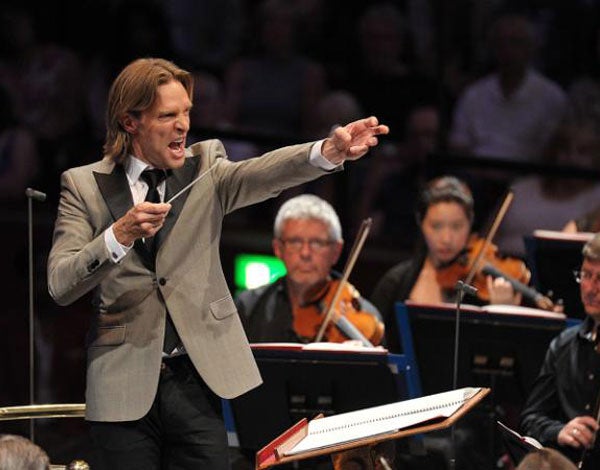

Last week in an interview the Eighties DJ and television presenter Noel Edmonds (famed for bringing Mr Blobby to our television screens) said that Radio 3 should be axed. It seems Edmonds has a consortium lined up to buy out the BBC. How wonderful it would be to have the Edmonds brand ruling the airwaves, giving us Blobby One and Blobby Two. He claims Radio 3 is elitist and out of date.
Well, I have news for him: he is the one who is perversely elitist and out of date (not to mention a megalomaniac). Over the weekend I witnessed the future of classical music at a Radio 3-broadcast event and the future’s bright – in fact, it’s dazzling.
The musical Messiah in human form is Eric Whitacre. This cool, good-looking Californian choral composer had a packed Royal Albert Hall transfixed with his stunning compositions, nestled in between American classics such as Gershwin’s ‘Rhapsody in Blue’ and Aaron Copland’s ‘Quiet City’.
Whitacre shot to global fame when he produced an online virtual choir where 182 singers from twelve countries made a YouTube hit of his composition Lux Aurumque, with more than a million views in the first two months. (It now has five million views – beat that, Noel.) Whitacre’s forte is combining technology and social media to create exciting contemporary music which is involving, melodic and, above all, fun.
Whitacre, appointed composer in residence at Sidney Sussex College, Cambridge, in 2010, conducted the beautiful Vaughan Williams-inspired ‘River Cam’ (written for Julian Lloyd Webber’s birthday). The Royal Philharmonic played this luscious pastoral theme with richness and depth.
It proved the perfect companion for what was to come, one of his most famous compositions, ‘Cloudburst’, where an ethereal a capella theme sweeps over you as the rain drops from lightly clicking fingers, which develops into loud clapping. Ringing bells are rain droplets and heavy percussion, thunderclaps. The audience are encouraged to click their fingers as well. Before you know it, it’s as if the rain is pouring down inside the Albert Hall. It’s brilliantly atmospheric.
The highlight of this concert was the premiere of ‘Deep Field’ for which we were required to download an interactive app. Deep Field is inspired by the first images produced by the Hubble Telescope, infinite galaxies containing billions of planets millions of light years away.
To evoke this – where space is stretched – strings create a shimmering suspension of time. Ominous sounds and block chords reminiscent of Charles Ives’ ‘The Unanswered Question’ create an eerie vastness.
At a given time we played our app and every phone and iPad produced a harmonic mood board so we felt like we are lost in space. As each theme came to its end, we were left with the eternal residue of sound around the hall.
Whitacre brings music into a new dimension and for many this concert was an out-of-body experience. Yes, it’s populist but it’s the only way contemporary music will reach a wider, younger audience who, once exposed, might have a thirst for more challenging repertoire. This is the future of music.






